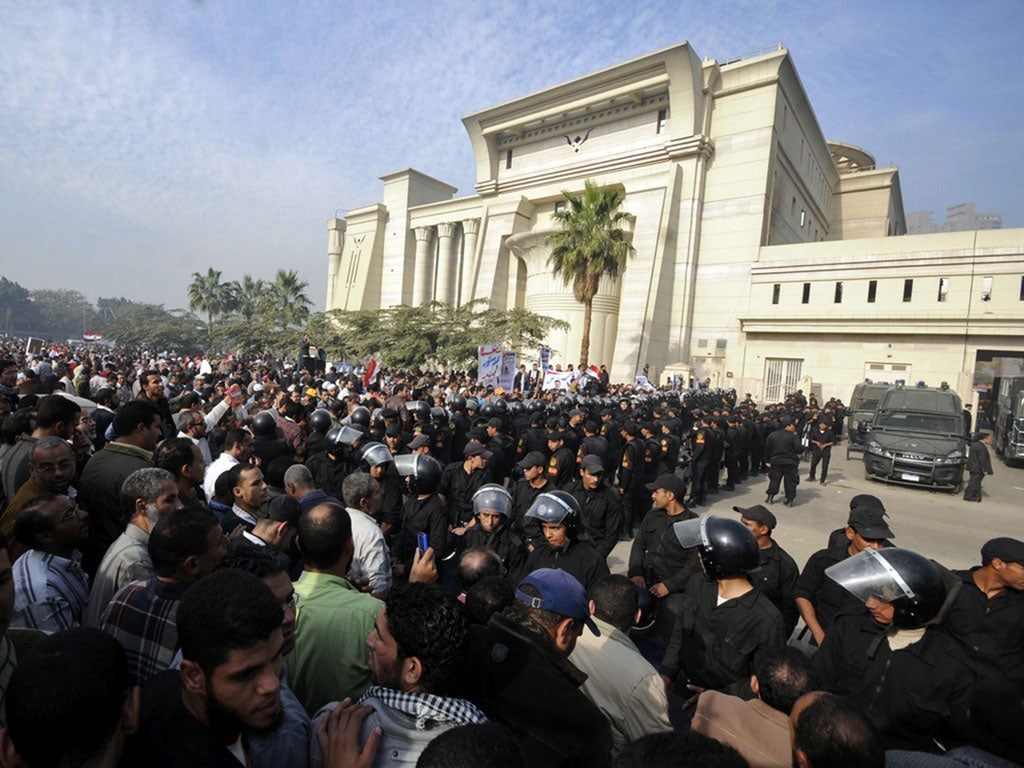Egypt's top judges go on strike as Brotherhood blockades court
'Climate of hate' after Morsi supporters back charter that critics say will pave way for Islamic state

Your support helps us to tell the story
From reproductive rights to climate change to Big Tech, The Independent is on the ground when the story is developing. Whether it's investigating the financials of Elon Musk's pro-Trump PAC or producing our latest documentary, 'The A Word', which shines a light on the American women fighting for reproductive rights, we know how important it is to parse out the facts from the messaging.
At such a critical moment in US history, we need reporters on the ground. Your donation allows us to keep sending journalists to speak to both sides of the story.
The Independent is trusted by Americans across the entire political spectrum. And unlike many other quality news outlets, we choose not to lock Americans out of our reporting and analysis with paywalls. We believe quality journalism should be available to everyone, paid for by those who can afford it.
Your support makes all the difference.Egypt's highest court has announced an open-ended strike, claiming that Islamist protesters who prevented judges from entering their offices were subjecting the judiciary to "psychological pressure".
With relations between the courts and Mohamed Morsi already at breaking point, thousands of the President's supporters staged a protest outside the Supreme Constitutional Court in southern Cairo on Saturday.
Judges had been expected to rule on the legality of Egypt's constituent assembly, the Islamist-dominated body which was criticised by rights groups for rushing through a constitution at the behest of the Muslim Brotherhood last week.
The ruling would have carried little legal weight, coming after a highly controversial presidential decree which emasculated Egypt's judiciary. Yet any declaration would have presented a public challenge to Mr Morsi from one of the key organs of state.
In a statement issued on Saturday, the Supreme Constitutional Court said that it was unable to work in a "climate filled with hatred". It added that its judges had been unwilling to enter the courthouse because they had feared for their safety.
Yesterday's development came after the Muslim Brotherhood and its Islamist allies staged an enormous weekend rally at Cairo University – a formidable challenge to their opponents who have been protesting against Mr Morsi in Tahrir Square.
The President's secular and Christian enemies, many of whom had been calling for him to revoke his recent decree, were doubly enraged last week after the hasty rubber-stamping of Egypt's new national charter. The document included clauses related to sharia law and freedom of speech which critics believe will be used over time to usher in an Islamic state.
"They have changed the identity of the country," said one rights lawyer, Nigad el-Borai. "They have laid the basis for a real religious state in the Middle East."
But the Muslim Brotherhood, wary after decades of repression, believes Mr Morsi's decree was a necessary evil – a temporary manoeuvre designed to overcome what they see as the gridlock caused by lingering elements of the old regime.
One protester at Saturday's Brotherhood rally reflected what the group is now banking on – that the majority of the country will view the liberal protesters in Tahrir Square as troublemakers chewing on sour grapes.
"There is chaos in the country," said Gaber Suleiman, who said he was not a member of the Brotherhood.
"The protesters in Tahrir Square are making problems. Why? Because they did not win the presidency."
A referendum on the new constitution has been called for 15 December.
Join our commenting forum
Join thought-provoking conversations, follow other Independent readers and see their replies
Comments